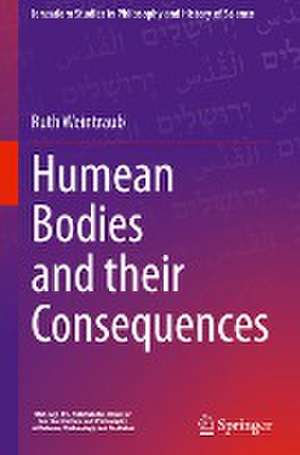Humean Bodies and their Consequences: Jerusalem Studies in Philosophy and History of Science
Autor Ruth Weintrauben Limba Engleză Hardback – 8 feb 2024
Preț: 642.03 lei
Preț vechi: 755.33 lei
-15% Nou
Puncte Express: 963
Preț estimativ în valută:
122.85€ • 128.61$ • 101.65£
122.85€ • 128.61$ • 101.65£
Carte tipărită la comandă
Livrare economică 07-21 aprilie
Preluare comenzi: 021 569.72.76
Specificații
ISBN-13: 9783031507984
ISBN-10: 3031507983
Pagini: 189
Ilustrații: XIV, 189 p. 1 illus.
Dimensiuni: 155 x 235 mm
Greutate: 0.46 kg
Ediția:1st ed. 2024
Editura: Springer International Publishing
Colecția Springer
Seria Jerusalem Studies in Philosophy and History of Science
Locul publicării:Cham, Switzerland
ISBN-10: 3031507983
Pagini: 189
Ilustrații: XIV, 189 p. 1 illus.
Dimensiuni: 155 x 235 mm
Greutate: 0.46 kg
Ediția:1st ed. 2024
Editura: Springer International Publishing
Colecția Springer
Seria Jerusalem Studies in Philosophy and History of Science
Locul publicării:Cham, Switzerland
Cuprins
Part I: Interpretation.- Chapter 1. Interpreting Hume on Bodies.- Chapter 2. Arguments in Support of the Idealist Interpretation.- Chapter 3. Meeting Objections to the Idealist Interpretation.- Part II: Metaphysical Consequences of the Idealist Interpretation.- Chapter 4. Consequences of the Idealist Interpretation for the Unity of Space.- Chapter 5: Consequences of the Idealist Interpretation for Causation.- Part III: Consequences of the Idealist Interpretation for Hume’s Science of Man.- Chapter 6. Spatial and Causal Thoughts from an Idealist Point of View.- Part IV: Consequences of the Idealist Interpretation for Hume’s Methodology.- Chapter 7. The Idealist Interpretation Renders Hume More of an Empiricist.
Notă biografică
Ruth Weintraub is Professor of Philosophy at Tel-Aviv University. Her publications include The Sceptical Challenge (1997), as well as articles in epistemology, on paradoxes and the philosophy of David Hume.
Textul de pe ultima copertă
This book defends the very contentious Idealist interpretation of Hume on external objects, and draws from it far-reaching metaphysical and epistemological consequences for Hume’s philosophy. Its interest is both interpretive and analytic. The content Hume ascribes to the belief in “bodies” is susceptible to more than one reading, and has not been systematically considered. Upholding the Idealistic interpretation is interesting in its own right, but also yields several important conclusions about the spatiality of objects, causation, Hume’s “science of man” and his epistemology. For instance, it argues that the Idealist reading means that there are no cross-temporal spatial relationships, and that the (more prevalent) Materialist reading takes Hume further away from methodological empiricism than does the Idealist counterpart, and may render his practice less in conformity with his official methodology.
Caracteristici
Takes both an interpretive and analytic approach to Hume's philosophy Aimed at not only academics but also graduate students and researchers Defends the very contentious Idealist interpretation of Hume on external objects





